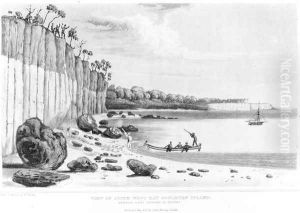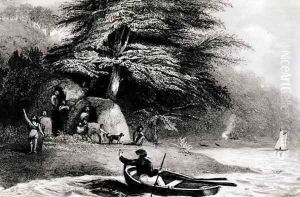King, Philip Parker Paintings
Philip Parker King, born on December 13, 1791, in Norfolk Island, Australia, was not primarily known as an artist but as an early explorer of the Australian and Patagonian coasts. The son of Philip Gidley King, a governor of New South Wales, King inherited a spirit of adventure and exploration. His contributions to charting and geographical knowledge were significant, though his artistic endeavors are less documented compared to his exploratory achievements.
King's early life was marked by education in England, where he attended the naval academy in Portsmouth, preparing him for a career in the Royal Navy. He embarked on a series of voyages that would cement his place in the annals of maritime exploration. From 1817 to 1822, King led important expeditions around the coast of Australia, filling in gaps left by the explorations of Matthew Flinders. His meticulous charting of these coasts was crucial for the safe navigation of these waters, contributing valuable knowledge to the maritime community.
In 1825, King was appointed to command an expedition to the southern coasts of South America, specifically to the area of Tierra del Fuego and the Strait of Magellan. His work in Patagonia, which involved detailed surveys and interactions with indigenous peoples, further enhanced his reputation as a skilled navigator and cartographer. King's observations and collected data from these voyages contributed significantly to the scientific study of these regions, including their geography, flora, and fauna.
Throughout his career, King demonstrated a keen interest in the natural sciences, collecting specimens and making observations that would be valuable to scientists back in England. While his primary legacy is as an explorer and navigator, the sketches and notes he made during his voyages also serve as historical documents that offer insights into the environmental and cultural conditions of the early 19th century in the regions he explored.
King's later years were devoted to serving in various naval and administrative positions, including participating in the establishment of the Australian Agricultural Company. He died on February 26, 1856, in North Sydney, Australia. Though not remembered primarily as an artist, Philip Parker King's contributions to exploration and the documentation of uncharted territories have left an indelible mark on the history of exploration and the expansion of geographical knowledge in the 19th century.

